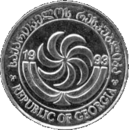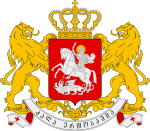Borjgali

Borjgali (Georgian: ბორჯღალი; also Borjgala or Borjgalo) is a Georgian symbol of the Sun with seven rotating wings over the Christian Tree of Life and is related to the Mesopotamian symbols of eternity[citation needed]. It is also related to the Triskelion, another rotational symbol of eternity. It is usually depicted within the circle that symbolizes the Universe. The roots of the Tree go into the "past" and its palm-like branches are for the "future". The Tree itself symbolizes the continuity between past, present and the future. The Borjgali is usually placed above the tree and symbolizes the Sun, eternal movement and life.
Etymology
The term Borjgali is believed to derive from Megrelian word ბარჩხალი ("barchkhali"), which literally means "strong shining". Some other scholars believe that it has different origins. In old Megrelian borj means "time" and gal means "pass" or "flow". So the whole phrase would mean "the flow of time".
Modern usage

Nowadays, the symbol is used in Georgian IDs and passports, as well as on currency and by the Georgian Rugby Union. Georgian rugby team players are called ბორჯღალოსნები (borjgalosnebi), which means "Men bearing Borjgali".
Gallery
-
Borjgali on a Georgian coin
-
Borjgali on 100 Georgian lari
-
Borjgali on Georgian Airways
-
Borjgali in Fereydunshahr
See also
References
- Historical Dictionary of Georgia, Alexander Mikaberidze
- ივ. ჯავახიშვილი „ქართველი ერის ისტორია“ ტომი I თბ., 1960 Ivane Javakhishvili, History of Georgian nation, Volume I, Tbilisi, 1960
- კახა ხიმშიაშვილი „საქართველოს ხუროთმოძღვრება ანტიკურ პერიოდამდე“ თბ., 1996 Kakha Khimshiashvili, Georgian architecture till ancient period, Tbilisi, 1996
- რატი იონათამიშვილი „ბორჯღალასა და სვასტიკის გენეზისისთვის“ თბ., 2006 Rati Ionatamishvili, Genesis of Borjgali and Swastika, Tbilisi, 2006
- სულხან-საბა ორბელიანი „სიტყვის კონა“ თბ., 1993 Sulkhab-Saba Orbeliani, Sitkvis Kona, Tbilisi, 1993
- ქართული ენის განმარტებითი ლექსიკონი თბ., 1986 Dictionary of Georgian language, Tbilisi, 1986
- T. Wilson „The swastika, the earlist known symbol and its migrations“ Wosh. 1990
- Тресиддер Джек, «Словарь символов» М. 1992
- უნივერსალური ენციკლოპედიური ლექსიკონი : [3 ტომად] / შეადგინა ალექსანდრე ელერდაშვილმა. - I-ლი გამოც.. - [თბ.] : ფანტაზია, 2006. - 28სმ.[MFN: 136149]
- Transcaucasian Banknotes, Arutiun Airapetian, p. 52






